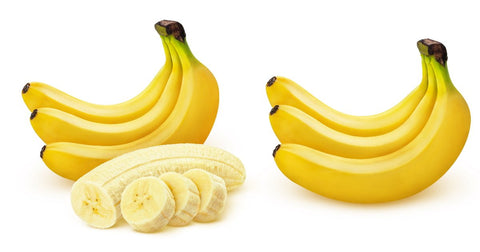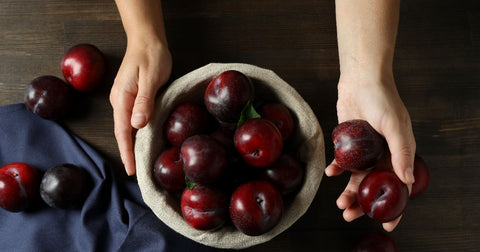Understanding the nutritional value of the foods we consume has never been more critical. Among the vast array of fruits available, the banana stands out as a universally loved and highly nutritious option. Known for its convenience, affordability, and pleasant taste, the banana is more than just a quick snack—it's a powerhouse of essential nutrients that offer numerous health benefits. This article looks into the nutritional composition of bananas and explores how incorporating this humble fruit into your diet can significantly boost your overall health.
Nutritional Composition of Bananas

Macronutrients
Bananas are a rich source of several key macronutrients that are essential for maintaining a healthy and balanced diet.
- Carbohydrates: Bananas are predominantly composed of carbohydrates, primarily in the form of natural sugars like glucose, fructose, and sucrose. These sugars provide a quick and easily accessible source of energy, making bananas an excellent option for a pre- or post-workout snack. Additionally, the carbohydrate content in bananas helps sustain energy levels throughout the day.
- Dietary Fiber: A medium-sized banana contains about 3 grams of dietary fiber, which is approximately 10% of the recommended daily intake. Fiber is crucial for digestive health, as it aids in regular bowel movements and helps prevent constipation. The fiber in bananas also contributes to a feeling of fullness, which can help with weight management.
- Proteins: While bananas are not a significant source of protein, they do contain small amounts. On average, a medium banana has about 1.3 grams of protein. Proteins play a vital role in building and repairing tissues, and although bananas are not protein-dense, they can contribute to your overall daily protein intake when combined with other protein-rich foods.
- Fats: Bananas are naturally low in fat, with less than 0.5 grams per medium fruit. The minimal fat content makes bananas a heart-healthy food option, as they provide essential nutrients without the added calories from fats.
Micronutrients
Bananas are packed with a variety of essential vitamins and minerals that support numerous bodily functions.
- Vitamins:
- Vitamin C: A medium banana provides about 10% of the daily recommended intake of vitamin C. This vitamin is vital for the growth and repair of tissues, absorption of iron, and maintenance of cartilage, bones, and teeth.
- Vitamin B6: Bananas are an excellent source of vitamin B6, providing around 20% of the daily value. Vitamin B6 is important for brain health, as it aids in the production of neurotransmitters and supports cognitive development.
- Folate: Although in smaller amounts, bananas contain folate, which is essential for DNA synthesis and repair, and is particularly important during periods of rapid growth, such as pregnancy and infancy.
- Minerals:

- Potassium: Bananas are renowned for their high potassium content, with a medium banana offering about 9% of the daily recommended intake. Potassium is crucial for heart health, as it helps regulate blood pressure and supports proper muscle and nerve function.
- Magnesium: Each banana provides approximately 8% of the daily value of magnesium. This mineral is involved in over 300 biochemical reactions in the body, including energy production, muscle and nerve function, and the regulation of blood sugar levels.
- Manganese: Bananas also contain manganese, contributing around 13% of the daily requirement. Manganese is important for bone health, metabolism, and antioxidant functions.
Health Benefits of Bananas
Heart Health
Bananas are a powerhouse of nutrients that contribute significantly to heart health. One of the most notable minerals found in bananas is potassium. Potassium plays a crucial role in managing blood pressure levels by counteracting the effects of sodium.
A diet rich in potassium can help maintain healthy blood pressure and reduce the risk of stroke and heart disease. Additionally, the dietary fiber in bananas helps reduce cholesterol levels, further promoting cardiovascular health. Soluble fiber, in particular, can bind to cholesterol in the digestive system and aid in its removal from the body.
Digestive Health
Bananas are known for their digestive benefits due to their high fiber content. The dietary fiber in bananas, primarily in the form of pectin, helps promote regular bowel movements and prevent constipation.
Pectin is a soluble fiber that can help normalize bowel function and improve overall digestive health. Furthermore, bananas contain resistant starch, particularly when they are slightly green. Resistant starch acts as a prebiotic, providing food for beneficial gut bacteria and enhancing gut health.
Energy Boost

Bananas are an excellent source of natural sugars, such as glucose, fructose, and sucrose, which provide a quick and easily digestible energy boost. This makes them a perfect snack for athletes and anyone needing a quick energy lift.
The carbohydrate content in bananas also provides sustained energy release, helping to keep you fueled throughout the day. Eating a banana before a workout can enhance endurance and improve performance.
Mood and Mental Health
Bananas can positively impact mood and mental health due to their rich content of Vitamin B6. This vitamin is essential for the production of neurotransmitters such as serotonin and dopamine, which regulate mood and promote feelings of well-being.
Additionally, bananas contain tryptophan, an amino acid that is a precursor to serotonin. Consuming bananas can help improve mood, reduce symptoms of depression, and enhance overall mental well-being.
Bananas in Special Diets
Weight Management
For those looking to manage their weight, bananas can be a valuable addition to the diet. They are low in calories and high in fiber, making them a satisfying snack that can help curb hunger and prevent overeating.
The fiber content in bananas adds bulk to the diet, promoting a feeling of fullness and reducing the likelihood of consuming high-calorie foods. Including bananas as a snack or part of a meal can support weight loss efforts and contribute to a healthy, balanced diet.
Diabetes Management

Bananas can be included in a diabetes-friendly diet with some considerations. While bananas contain natural sugars, they have a relatively low glycemic index (GI), meaning they have a slower impact on blood sugar levels compared to high-GI foods. The fiber in bananas helps regulate blood sugar levels by slowing down the absorption of sugar into the bloodstream. It is important for people with diabetes to monitor portion sizes and pair bananas with protein or healthy fats to further stabilize blood sugar levels.
Athletic Performance
Bananas are often favored by athletes for their nutritional benefits that support physical performance. They provide a quick source of energy, making them an ideal pre- and post-workout snack. The natural sugars in bananas are easily digestible and provide an immediate energy boost during exercise.
Additionally, bananas help replenish electrolytes, particularly potassium, lost through sweat during intense physical activity. This helps prevent muscle cramps and supports optimal muscle function and recovery.
Including bananas in your diet can offer numerous health benefits, making them a versatile and nutritious fruit for various dietary needs. Whether you are looking to manage your weight, control blood sugar levels, or enhance athletic performance, bananas can be a valuable addition to your daily routine.
Practical Ways to Incorporate Bananas into Your Diet
Bananas are versatile and can be easily incorporated into various meals and snacks throughout the day. Here are some practical and delicious ways to enjoy bananas:
Simple Snacks

- Eating Raw: The simplest way to enjoy a banana is to eat it raw. It makes for a quick, portable snack that requires no preparation.
- Pairing with Nut Butter: For a more satisfying snack, pair a banana with a tablespoon of your favorite nut butter, such as almond or peanut butter. This combination provides a good balance of carbohydrates, healthy fats, and protein.
Breakfast Options
- Smoothies: Bananas are a great addition to smoothies, providing natural sweetness and a creamy texture. Combine a banana with your choice of fruits, vegetables, a protein source (like yogurt or protein powder), and a liquid base (such as almond milk or orange juice) for a nutritious breakfast.
- Banana Pancakes: Mash a banana and mix it into your pancake batter for added flavor and nutrition. Alternatively, you can make simple two-ingredient banana pancakes by mixing one mashed banana with two beaten eggs and cooking as you would regular pancakes.
Healthy Desserts
- Banana Bread: Use ripe bananas to make a healthier version of banana bread by reducing the amount of added sugar and using whole wheat flour. You can also add nuts or seeds for extra nutrition.
- Frozen Banana Treats: For a refreshing treat, slice bananas and freeze them. You can eat the slices as is or dip them in melted dark chocolate before freezing for a healthier alternative to ice cream.
Potential Risks and Considerations

While bananas are generally safe and beneficial for most people, there are a few potential risks and considerations to keep in mind:
Allergies
- Symptoms and Prevalence: Although rare, some people may be allergic to bananas. Symptoms of a banana allergy can include itching or swelling in the mouth and throat, hives, or digestive issues. If you experience any of these symptoms after consuming bananas, it's important to seek medical advice.
Overconsumption
- Impact on Blood Sugar Levels: Bananas have a moderate glycemic index, meaning they can cause a moderate rise in blood sugar levels. While this is usually not an issue for most people, those with diabetes or insulin resistance should monitor their banana intake and pair bananas with protein or fat to help stabilize blood sugar levels.
- Excess Potassium Intake: Bananas are a rich source of potassium, which is essential for heart health and muscle function. However, consuming too many bananas can lead to hyperkalemia, a condition characterized by excessively high levels of potassium in the blood. This is especially a concern for people with kidney disease or those taking medications that affect potassium levels. It's important to consume bananas in moderation as part of a balanced diet.
Frequently Asked Questions
Are bananas good for weight loss?
Yes, bananas can be a helpful addition to a weight loss diet. They are low in calories and high in fiber, which can help you feel full longer and reduce overall calorie intake. Additionally, their natural sweetness can satisfy sugar cravings, making them a healthy alternative to sugary snacks.
Can people with diabetes eat bananas?
People with diabetes can eat bananas, but they should do so in moderation. Bananas have a moderate glycemic index, meaning they can affect blood sugar levels. It's important for people with diabetes to monitor their portion sizes and pair bananas with protein or healthy fats to help manage blood sugar levels effectively.
What are the main vitamins and minerals found in bananas?

Bananas are rich in several important vitamins and minerals. They are an excellent source of Vitamin C, Vitamin B6, and folate. They also contain significant amounts of potassium, magnesium, and manganese, which are essential for various bodily functions, including maintaining healthy blood pressure, supporting metabolic processes, and promoting bone health.
How do bananas benefit heart health?
Bananas are beneficial for heart health primarily due to their high potassium content, which helps regulate blood pressure by balancing sodium levels in the body. The fiber in bananas also contributes to heart health by lowering cholesterol levels. Together, these effects can reduce the risk of heart disease and stroke.
What is the best time to eat a banana for maximum health benefits?
There is no specific "best" time to eat a banana, as they can be beneficial at any time of day. Eating a banana in the morning can provide a quick energy boost and essential nutrients to start your day. Consuming one before or after a workout can help with energy levels and muscle recovery. Ultimately, the best time to eat a banana depends on your personal dietary needs and lifestyle.
Conclusion
Bananas are more than just a convenient snack; they are a nutritional powerhouse packed with essential vitamins, minerals, and fiber that support various aspects of health. From promoting heart health and aiding digestion to providing a natural energy boost and enhancing mood, bananas offer a multitude of benefits that can enhance your well-being. Additionally, their versatility makes it easy to incorporate them into your daily diet, whether as a simple snack, part of a balanced breakfast, or a healthy dessert option.
As with any food, moderation is key. While bananas are generally safe and beneficial for most people, it's important to be mindful of potential allergies and the impact of overconsumption on blood sugar levels and potassium intake.
Incorporating bananas into a balanced diet can be a delicious and effective way to boost your nutritional intake. For personalized dietary advice and to fully understand how bananas can fit into your health goals, consider consulting a nutritionist. Embrace the many benefits of this humble fruit and enjoy the positive impact it can have on your health and vitality.


.png?v=1737390083)
.png?v=1737187409)


